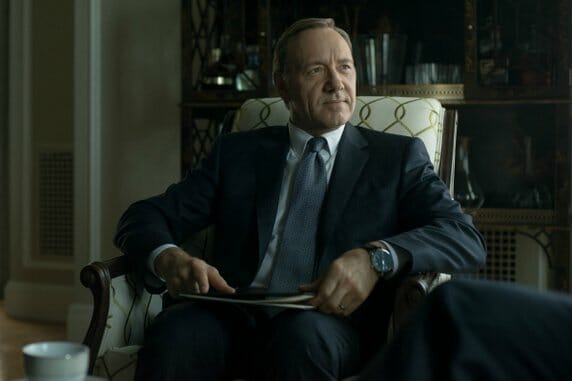House of Cards: “Chapter 18” (Episode 2.05)

“Chapter 18” opens with a Chinese man gasping for air as he has sex with a white couple, his head in a translucent plastic bag. This is on-screen for just a few seconds before we cut to a Civil War re-enactment and the bored audience watching it. This, if nothing else, is my answer to the many people who dislike House of Cards, generally not for what the show is but for what it isn’t. The show is sleazy; it’s campy; it’s over-the-top, and I mean that in the best possible way. If it wasn’t—if these political stories were played straight—the show would be boring. By heightening every element of politics until they hit the ceiling, by offering us these overloaded images in every episode, the show is venturing out into new ground.
The word most commonly used to denigrate House of Cards is “shallow,” which generally goes unexplained, but I suspect that’s because of expectations people have for a show with an anti-hero as a protagonist. Frank Underwood is not another Tony Soprano like so many others on prestige television—in most ways, he’s closer to Lucifer (or at least Hitler). He’s not a tortured man; he’s a sociopath, and most of the show’s other characters are only a little bit more nuanced. The situations the show presents, though, the web of influence and deals that surround House of Cards’s version of Washington D.C., are where the complexity comes in. It’s not that the characters don’t matter; it’s just that they’re secondary to the many setpieces, the grand gestures of disgust the show has for the way politics in America are run.
-

-

-

-

-

-

-

-

-

-

-

-

-

-

-

-

-

-

-

-

-

-

-

-

-

-

-

-

-

-

-

-

-

-

-

-

-

-

-

-








































